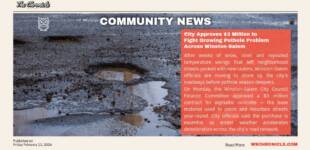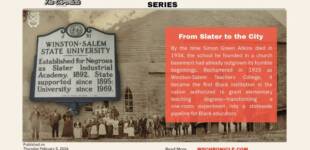Outcry spurs tax value upticks
Residents in Monticello Park have been granted some relief from the devaluation of their homes, following a decision by the Forsyth County Board of Equalization and Review last week.
Many homeowners in the community, which is situated off Carver School Road, saw their home values drop to between $30,000 and $50,000 – about a third of their 2009 tax values – during the county tax assessors’ 2013 revaluation process, according to Tax Assessor John Burgiss. Earlier this month, the Board, which is charged with reviewing tax lists, hearing appeals from property owners and making any necessary appraisal changes, requested that tax assessors reinvestigate 14 communities where appeals and public outcry over the 2013 revaluations had been most widespread. Monticello Park was in the number, and, after visiting the community and assessing the homes more closely, tax assessors recommended that the Board reinstate a significant portion of value to 50 homes whose owners did not participate in the appeals process.
“It’s a substantial increase, almost doubling what the one-third value, but we still have a value on these properties that is lower than 2009, even after these changes,” Burgiss said.
He said the community had only three eligible sales during the two year period (2011 and 2012) that assessors used to calculate the home values, leaving a greater margin for error in the tax assessors’ process. A second neighborhood, which Burgiss declined to identify, is also likely to see its values increase following a recommendation Burgiss and his team will make to the board on June 28.
“This is not unusual but it’s also not common. It’s not something we’ve done a lot of,” he said of the recommendations. “(But) we always said if we found something that justified it being redone, we’d bring it to the board.”
June 28 will also be the deadline for homeowners who disagree with the values their homes were given to file a formal appeal asking for the Board to review their individual case. Affected Monticello Park residents and all those whose homes’ values have been changed as a result of an appeal will be given additional time to appeal, Burgiss said.
Rev. Willard Bass, president of the Ministers Conference of Winston-Salem and Vicinity, said the changes taking place in Monticello Park are evidence that the public’s response to the revaluation has had an impact.
“I’m just glad that we’ve gone through the process, that we were persistent,” he said of the Conference, which banded with representatives from local neighborhood organizations to highlight the revaluation process and encourage owners to file appeals. “There were some things that weren’t right, and I think our process worked. We got some positive results out of that.”
The Ministers Conference has been outspoken in its criticism of the revaluation process, which many say disproportionately affects black and brown communities. Bass said many homeowners have reported regaining much of the value they’d lost in their homes through the appeals process – and now through the Board’s actions in Monticello Park – but he still objects to the tax assessors’ methods.
“It’s an archaic, old process and now that we’ve had the experience with the financial fallout, we definitely need to look at this revaluation process,” he said.
Konnoak Hills resident Carolyn Highsmith has worked closely with the Ministers Conference to inform and engage affected communities about issues surrounding the revaluation and helped to amass close to 400 informal appeals from homeowners. Highsmith says residents of her diverse community were affected by the revaluation, losing 30-40 percent of their home values on average. Though they were far from being the hardest hit neighborhoods, the devaluation was still a difficult burden for Konnoak homeowners to bear, Highsmith said.
“I had sticker shock when I first saw my reappraisal because my home was devalued by $60,000 and I knew I had to put a roof on it in the next two or three years,” she commented. “…This reappraisal wasn’t in line with the market value because of the low number of home sales (in the area).”
Highsmith filed an informal appeal and was able to recoup over 80 percent of the value she’d lost. Many others in the community reported similar results from their appeals, Highsmith said, but other neighborhoods’ appeals brought little change in value. She added that the stability of her neighborhood had hurt homeowners in the revaluation process because there was little material to go by in assessing value.
Board of Equalization and Review member David Shaw said the tax assessors did a “superb job” with the revaluation, and that both the assessors office and the board are committed to accuracy in assigning home values.
“It’s a massive undertaking and I think for the most part, their tally is more right than wrong,” said Shaw, who has served on the Board off and on for more than 20 years.
Shaw, a city native and longtime realtor, said home values plummeted this time around because of the housing market crisis that has taken place since the last revaluation, both locally and in many communities across the US.
“There were some pretty dramatic changes in some areas, even in the best case situation, it’s been pretty dramatic,” he said. “…We’re accustomed to seeing values going up. In other years, we’ve seen almost exclusively requests to lower the value, and this year we’re seeing requests to increase.”
For those who have weathered the 2013 revaluation, there’s good news on the horizon : the housing market is on the mend, the Wake Forest University alumnus said. He added that the board will continue to strive for excellence – and accuracy – as it hears appeals and reviews any further recommendations Burgiss makes on Friday.
“The board is deeply committed to doing the right thing and getting those values current,” he declared. “That’s what we’re there to do, whether we’re raising the values or lowering the values.”
The Tax Assessor’s Office is slated to conduct its next revaluation in 2017.










